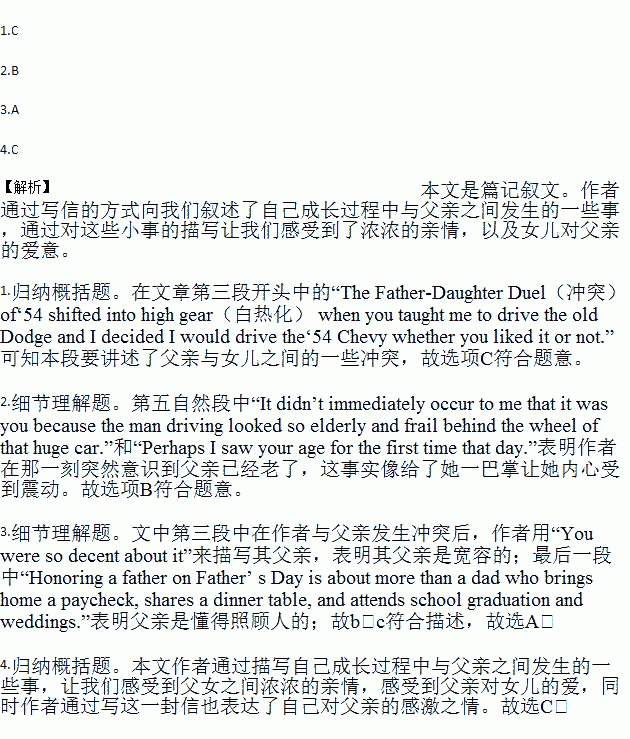题目内容
You’ll soon be 84 years old, Dad, and you and I will have had 55 Father’s Days together.
You know, there was a time when we were not only separated by the generation gap but completely polarized (对立) by it. Split by: age and experience, opinions, hairstyles, cosmetics, clothing and boys.
The Father-Daughter Duel(冲突) of‘54 shifted into high gear(白热化) when you taught me to drive the old Dodge and I decided I would drive the‘54 Chevy whether you liked it or not. The police officer who accompanied me home after you reported the Chevy stolen late one evening was too young to understand father-daughter politics and too old to have much tolerance for a 16-year-old. You were so decent about it, Dad, and I think that was probably what made it the worst night of my life.
Our relationship improved greatly when I had babies. I didn’t know what to expect of you and Mom as grandparents but I didn’t have to wait long to find out. Those babies adored you then just as they adore you now.
I suppose I saw our relationship as aging together, rather like a fine wine. But the oddest thing happened last week. I was at a stop sign and I watched as you turned the corner in your car. It didn’t immediately occur to me that it was you because the man driving looked so elderly and frail behind the wheel of that huge car. It was rather like a slap in the face delivered from out of nowhere. Perhaps I saw your age for the first time that day.
Fifty years ago this spring, we planted kohlrabi together in a garden in Charles City, Iowa.
This week, we’ll plant kohlrabi together again, perhaps for the last time but I hope not. I don’t understand why planting kohlrabi with you is so important to me but it is. I don’t even like kohlrabi... but I like planting it with you.
Honoring a father on Father’ s Day is about more than a dad who brings home a paycheck, shares a dinner table, and attends school graduation and weddings. It’s more about unconditionally loving children who are stubborn, who know everything and won’t listen to anyone. It’s about loving someone more than words can say, and wishing that it never had to end.
I love you, Dad.
1. What is the purpose of the third paragraph?
A. To prove that the father is very strict.
B. To describe the father-daughter politics.
C. To show the conflict between the author and her father.
D. To condemn the policeman for lack of understanding.
2.What does the author mean by saying “a slap in the face” in the fifth paragraph?
A. She regretted the fights she had with her father.
B. She suddenly realized that her father was so old and could be gone one day.
C. She was ashamed of herself that she hadn’t taken good care of her father.
D. She suddenly realized that she had caused a lot of trouble for her father.
3.Which of the following words can describe the author’s father?
a. Unreasonable b. Caring c. Tolerant d. Stubborn
A. bc B. bd
C. acd D. bcd
4.The author wrote his father this letter to _________.
A. tell him about their conflicts B. say sorry for her being stubborn
C. express her gratitude to him D. remind him of the early incident
 通城学典默写能手系列答案
通城学典默写能手系列答案 金牌教辅培优优选卷期末冲刺100分系列答案
金牌教辅培优优选卷期末冲刺100分系列答案

 t always easy.
t always easy. , they often reach excellent academic results.
, they often reach excellent academic results. appy to be playing in the backyard with my toys.
appy to be playing in the backyard with my toys.